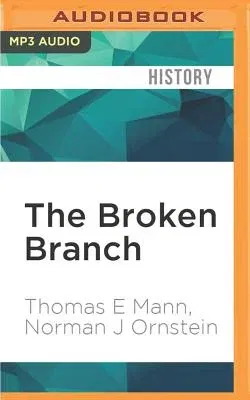Congress is the first branch of government in the American system, write
Thomas E. Mann and Norman J. Ornstein, but now it is a broken branch,
damaged by partisan bickering and internal rancor. The Broken Branch
offers both a brilliant diagnosis of the cause of Congressional decline
and a much-needed blueprint for change, from two experts who understand
politics and revere our institutions, but believe that Congress has
become deeply dysfunctional. Mann and Ornstein, two of the nations most
renowned and judicious scholars of government and politics, bring to
light the historical roots of Congress's current maladies, examining 40
years of uninterrupted Democratic control of the House and the stunning
midterm election victory of 1994 that propelled Republicans into the
majority in both House and Senate. The byproduct of that long and
grueling but ultimately successful Republican campaign, the authors
reveal, was a weakened institution bitterly divided between the parties.
They highlight the dramatic shift in Congress from a highly
decentralized, committee-based institution into a much more regimented
one in which party increasingly trumps committee. The resultant changes
in the policy process--the demise of regular order, the decline of
deliberation, and the weakening of our system of checks and
balances--have all compromised the role of Congress in the American
Constitutional system. Strong majority leadership in Congress, the
authors conclude, led not to a vigorous exertion of congressional
authority but to a general passivity in the face of executive power. A
vivid portrait of an institution that has fallen far from the
aspirations of our Founding Fathers, The Broken Branch highlights the
costs of a malfunctioning Congress to national policymaking, and
outlines what must be done to repair the damage.

